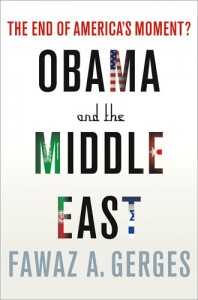In Obama and the Middle East: The End of American’s Moment?, a new book by one of the foremost scholars on Middle East politics, Fawaz A. Gerges looks at America’s progress (or lack thereof) in the Middle East. Paying special attention to President Obama’s policies in the region, Gerges argues that the United States is losing influence in the Middle East and that President Obama’s strategy for the region merely resembles those of past administrations. Rising world multipolarity and the revolutionary changes sweeping across the Middle East serve to contextualize Gerges’ argument of America’s declining influence.

Looking US foreign policy objectives in the Middle East under various administrations (with particular focus on Bush’s two terms and under current President Obama), Gerges reasons that “the region’s importance lay in preserving western access to two-thirds of the world’s oil reserves, the longstanding commitment to the security and well-being of Israel and the stability of America’s traditional arab allies, particularly Saudi Arabia, the Gulf sheikdoms and Egypt” (p. 17). The uprisings by the “Tahrir generation” was the first tangible sign of America’s disengagement in the ME. “While Obama officials debated what to say and do, protesters seized the moment” (p. 107) allowing them to finally be the real force of democratic change in their countries. Ultimately, Gerges concludes, the real challenge facing President Obama is whether “he can align US foreign policy with progressive and democratic voices in the region” (p. 246).
The book also reviews the historical context of America’s involvement in the Middle East – from the end of World War II to the post-Cold War era. In addition to President Obama’s policies in the region, the Bush Doctrine that supplied the ideological foundation for the “global war on terrorism” and the hunt for Al Qaeda (the invasion of Afghanistan and the war in Iraq) is similarly discussed. Gerges actually dedicates an entire chapter to the “war on terror.” A requisite chapter on the Israeli-Palestinian Peace process is also provided. The “pivotal states” of Egypt, Iran and Turkey are considered as emerging regional contenders for challenging American dominance in the ME. Finally, Gerges concludes that while foreign policy in the Middle East under President Obama has more continuity with the past than real change, he concedes that “an attempt has also been made to normalize America’s relations with Muslims and to make a break with the Bush legacy of moral crusading and social engineering.”
The book is incredibly well researched and I happen to largely agree with his premise that U.S. dominance in the Middle East is declining. Gerges, however, does not take into account the politicization of women’s rights in the Middle East and the role of this phenomenon in facilitating the implementation of Bush’s Freedom Agenda. In his chapter “The Bush Doctrine,” Gerges discusses the Freedom Agenda, which the former President believed would “reinforce fragile democracies, support democratic dissidents in countries suffering from oppressive rule and promote human rights”. The underlying logic was that by transforming the structure of Middle Eastern – mostly Muslim – societies, the U.S., post 9-11, would eradicate the root causes of extremism. The invasion of Iraq was part and parcel of the Freedom Agenda. But Gerges does not touch upon how the former President depicted the invasion of Iraq as a path to women’s empowerment which happened to fit under his doctrine to promote human rights in the Middle East.
In the book, What Kind of Liberation?: Women and the Occupation of Iraq, authors Nadje Al-Ali and Nicola Pratt explain how Condoleezza Rice and Laura Bush were part of a campaign to reassure the world that the U.S. was actually concerned with women’s liberation in Iraq. The book actually concludes that women in Iraq are worse off, a conclusion further supported by scholarly work on the rights of women post-American occupation.
In Leila Ahmed’s seminal Women and Gender in Islam: Historical Roots of a Modern Debate, she explains that European colonizers used the pretext of Muslims mistreating women as a justifiable reason for colonial domination. This premise in part facilitated American occupation of Iraq in the present day (the search for WMDs being the main imperative for then-President Bush). The U.S. National Security Strategy under Obama (and Secretary Clinton) states, “Countries are more peaceful and prosperous when women are accorded full and equal rights and opportunity.” While this statement holds true when applied to individual nations, further efforts to politicize women’s rights in predominantly Muslim countries will continue to be met with discord and may serve to further detract the U.S. from its foreign policy objectives.
Conversely, in “Paradise Beneath Her Feet,” Council on Foreign Relations expert Isobel Coleman proposes an alternative solution to the beneficiaries of American foreign policy. She makes the case that the emerging Islamic feminist movement is the most effective way to empower women in the “greater Middle East,” a region that she takes to Iran, Pakistan, Afghanistan, Iraq, and Saudi Arabia. She argues that Islamic feminism holds special credibility and grassroots appeal and can ultimately benefit the stability and prosperity of the greater Middle East in addition to their relationships with the West. Coleman also recommends that the U.S. limit its role to providing “technical expertise” and “financial assistance,” the latter of which in particular can be problematic in some Muslim nations where Western aid is perceived to come with an agenda.
The Middle East is a key foreign policy area for the U.S., and since the region is host to the current Arab Spring, war- and occupation-ravaged Iraq, and a number of other issues, the status of women in the region is a cross-cutting issue and one that is continuously pushed under the microscope. It has therefore become important to take into account the challenges of gendering development through U.S. foreign policy. Foreign policy experts are now beginning to consider how a “gender perspective” is relevant not only to those concerned with making the world better for women, but also to anybody who cares about military effectiveness, alliance stability, democracy promotion, actionable intelligence, the stem of pandemic disease, or successful nation-building. In this respect, while Gerges provides a meticulous assessment on America’s declining role in the Middle East, a gendered analysis on how America’s foreign policy engagements affect the female half of the population in this region would be an important perspective to include in his analysis. In the end, while promoting gender-based development in developing countries is important, a homegrown movement that understands the economic and social deficiencies of oppressing women is the most efficient way to ensure real change. The question however remains: will foreign policy under President Obama allow for such movements in the Middle East to meet with success?












